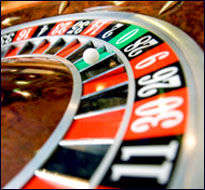Commercial casino gambling promises an infusion of revenue for cash-strapped cities, states and countries, and was legal in 12 states as of 2008, according to a 2011 paper published in the Journal of Real Estate Finance and Economics. (Indian gaming occurs in 28 states.) Supporters of legalized casino gambling argue that casinos, in addition to generating significant taxable income and creating jobs, help boost sales at nearby businesses. Opponents, however, argue that a casino in fact keeps customers away from area businesses by providing a self-contained entertainment, dining and shopping experience — and also encourages a host of undesirable social behaviors.
The paper, by Clemson University and the College of Charleston, “Casino Revenues and Retail Property Values: The Detroit Case,” assesses the effect of commercial casinos on both local retail property values and levels of business activity in the city. The researchers examined the impact of Detroit’s three commercial casinos, clustered within the city’s urban core and located within easy walking distance of numerous retail and restaurant businesses. Operating on the assumption that rising property values reflect increases in retail activity and profitability, the researchers analyzed data on 488 retail property locations and sales in Detroit between May 2001 and June 2008. They also looked at population growth estimates between 2000 and 2007, as well as monthly casino revenue reports, to determine shifts in property values over time and which businesses were most affected by the casinos.
Key study findings include:
- “Casino revenues have a positive influence on retail property values…. A 1% increase in casino revenues is predicted to lead to an average 1.235% increase in retail property values.”
- “Retail properties within the 5-mile radius are influenced by casino revenues and more strongly so than those outside the 5-mile casino radius…. Visitors considering Detroit as a casino destination are more likely to lodge, shop, dine and find other entertainment venues in close proximity to casinos.”
- As casino revenues increase, the property values of nearby convenience stores, service stations restaurants and “freestanding general” businesses (such as theaters or clothing stores) also rise.
- Lower property values were associated with older properties, outdated or poorly maintained properties, properties that include a significant percentage of undeveloped land, and properties held by speculators. Values for urban properties and larger properties grew more during the same period.
- Retail property values rose during this period despite declines in both area population and employment rates between 2001-2008. The researchers suggest that these increases were due to more business activity around the casinos and an influx of more affluent residents to the city’s core, and not the result of urban growth.
The researchers suggest that the presence of casinos has a “cumulative attraction” effect that fuels higher demand for related services, and that “the commercial casinos in Detroit have had a positive impact on retail property values in the city,” especially for properties located within five miles of the casinos. However, the authors caution against drawing “strong conclusions” about the implications for other markets, as Detroit has “notably unique” dynamics.
Tags: consumer affairs, economy, municipal, gambling


Expert Commentary